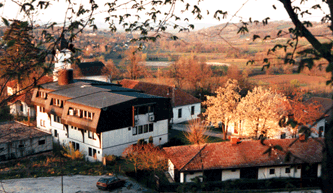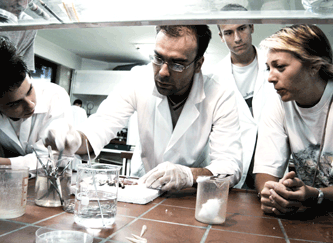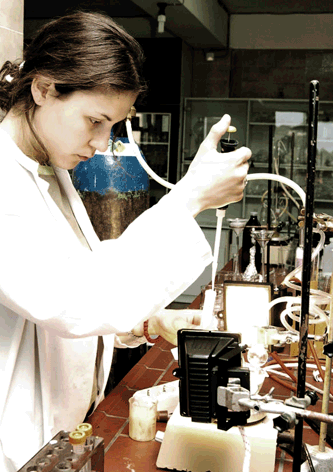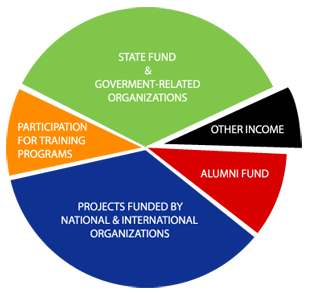Petnica Science Centre - Innovative Support to gifted Students and Ethusiastic Teachers
Centro Científico de Pétnica en prácticas
[p:justify]El Centro Petnica se encuentra a 7Km de la ciudad de Valievo en el Oeste de Serbia, aproximadamente a 70 Km al suroeste de Belgrado. Valievo está bien conectado con Belgrado por buses y trenes, así como con distintos destinos en Serbia y Montenegro. Valievo está conectado a través de buenas vías con Croacia (100Km), Bosnia y Herzegovina (80km), Macedonia (400km), Hungría (250km), Bulgaria (300km), y Rumania (250km).
El Centro de Ciencias Petnica tiene en general buenas facilidades, tanto de hospedaje como educativas, para acomodar a estudiantes inscritos en los programas a lo largo del año. El Centro tiene siete edificios para una extensión de 4,000 metros cuadrados, que sirven para distintos propósitos.
El dormitorio tiene 100 camas para estudiantes en habitaciones con acomodación para 4 y 6 personas, así como varios apartamentos para maestros y conferencistas invitados. El restaurante sirve a todos los estudiantes que viven allí. 
Hay salones de clase, laboratorios para biología, geología, física, química, electrónica, astronomía, óptica y arqueología, una moderna aula de computadores y una biblioteca central de literatura científica (40,000 libros y revistas). Hay cientos de películas y un rico archivo de imagines con cerca de medio millón de diapositivas, muchas de las cuales se encuentran en medios digitales, lo que facilita una vista rápida y de alta fidelidad. La biblioteca es el centro de muchas actividades educativas y de otro tipo, considerando el hecho de que el PSC presta particular atención en la orientación de los jóvenes para que utilicen distintas fuentes de información. Los estudiantes y el equipo tienen libre acceso a un cierto número de computadores conectados con Internet y habilitados con servicios de Intranet.
El hecho de que la mayoría de los equipos sean usados también para el trabajo científico profesional en algunos de los proyectos que el PSC sigue de manera simultanea con sus programas educativos, permite a los estudiantes seguir el proceso científico real e incluso involucrarse en éste, enfrentando todos los problemas prácticos y dificultades que en éstos se presentan. A través de proyectos diseñados cuidadosamente los estudiantes se hallan en la posición extraña de “experimentar la ciencia”. Por lo anterior, PSC puede ser descrito como un “ambiente científico”, ya que es un espacio donde los jóvenes están rodeados por literatura e instrumentos científicos, actividades de investigación en vivo y son asesorados por científicos profesionales. Adicionalmente, este ambiente promueve una interacción valiosa entre jóvenes con talentos, intereses y problemas similares. Esto ilustra un aspecto único y valioso de la educación en Petnica - aprender a través de la investigación. 
Los grupos objetivo son adolescentes (la mayoría estudiantes de secundaria, entre 14 y 18 años) casi el 70%, estudiantes universitarios casi el 10% y maestros de escuela casi el 20%.
La mayoría de los programas cubren la totalidad del país más la mayoría de países vecinos: Croacia, Bosnia y Herzegovina, Montenegro, Macedonia, Bulgaria, Eslovenia y otros.
La idea básica de los programas de Petnica es permitir a los estudiantes motivados aprender a través de la investigación
Selección de los participantes
La selección de participantes se realiza una vez a la año, PSC publica información sobre los programas del año siguiente incluyendo la guía y los formatos de aplicación y los distribuye en aproximadamente 600 escuelas. Después de la fecha límite de entrega, un equipo especial de selección pasa de 2 a 4 días seleccionando a los participantes invitados para los programas de estudiantes. Los maestros interesados en los cursos de formación en-servicio son informados a través de medios especializados, asociaciones de maestros, y a través del departamento regional del Ministerio de Educación.
Tipos de programas y métodos de entrenamiento
El ciclo educativo anual en Petnica consiste en cuatro seminarios que duran entre 3 y 13 días durante los cuales los estudiantes asisten a las conferencias seleccionadas. Con relación a los programas específicos, hay una distinción entre el número de participantes: Hay entre 120 y 150 programas de días múltiples desde mediados de enero hasta mediados de Diciembre ( 3-7 días de cursos de formación y talleres; 4-10 días de cursos para estudiantes con actividades teóricas y prácticas; 10-20 días con campos científicos de verano; 4-10 días con salidas de campo; fuera de Petnica en áreas específicas como Geología, Arqueología, Observación astronómica, Biología y estudios ambientales). Hay aproximadamente 2,000 estudiantes, más 600 participantes en los cursos para maestros y alrededor de 2-3 días de conferencias y reuniones de presentación, cada año.
Los estudiantes tienen la posibilidad de asistir varias veces para un total de casi 32 días al año y pueden aplicar el año siguiente para participar en más programas. Los estudiantes tienen la posibilidad de hacer proyectos de investigación individual en varios campos y temas con el fin de aprender y practicar métodos de investigación con problemas reales. El Centro Petnica participa activamente en intercambios internacionales de estudiantes, permitiendo a los estudiantes más brillantes de escuelas de provincia ser parte de reconocidos campos científicos de verano, encuentros o conferencias y cuenta con la herramienta del Centro de Recursos para Maestros abierto para maestros que de forma individual o grupal pueden acceder a un material selecto que abarca distintos aspectos de la práctica escolar. Los ex-alumnos de Petnica (ex-participantes) tienen adicionalmente la posibilidad de ascender en su rol desarrollando programas en PSC.
Costos de participación
La mitad de los cursos de formación para estudiantes (Cursos de invierno y Cursos/ Campos de verano) tienen una cierta participación económica de los estudiantes con bases voluntarias del 25% sobre el costo real del programa. Otros programas para estudiantes son completamente gratuitos (los participantes deben pagar el transporte desde y hacia la ciudad de Valievo). Algunos de los programas de formación para maestros son financiados por otros programas u organizaciones y, de consecuencia, son gratuitos para los participantes.
Algo distinto a la práctica escolar existente
• EDUCACIÓN FLEXIBLE diseñada para satisfacer las necesidades, talentos y capacidades individuales;
• EDUCACIÓN INNOVATIVA que transfiera los descubrimientos científicos actuales, las teorías y problemas a un currículo exhaustivo y mejores procesos de enseñanza;
• EDUCACIÓN CON IGUALDAD DE OPORTUNIDADES que no haga distinción de género, diferencias sociales, grupos étnicos o religiosos;
• EDUCACIÓN PARA LA COMUNIDAD GLOBAL que incremente el entendimiento mutuo de los estudiantes, la tolerancia, la amistad, y el respeto por la diversidad; una educación que evita los conflictos entre grupos de individuos; una educación contra el extremismo político, la intolerancia, la xenofobia, el racismo y la violencia;
• LA PARTICIPACIÓN ESTUDIANTIL en la creación y realización del currículo como una totalidad;
• EDUCACIÓN PARA EL FUTURO que prepare a los estudiantes para reconocer el poder, las oportunidades y los riesgos de las ciencias y tecnologías modernas, así como para pensar más acerca del futuro;
• EDUCACIÓN BIDIRECCIONAL en donde los maestros puedan aumentar sus conocimientos y experiencia en una interacción continua con estudiantes curiosos y motivados, y donde cada estudiante tenga la oportunidad de enseñar a otros estudiantes en el campo donde él/ ella tiene más conocimientos.
Cuando los estudiantes van a Petnica por segundo, tercero o cuarto año de forma continua, obtienen cada vez problemas de investigación más complejos y exigentes. De forma paralela a la investigación se involucran con el proceso de formación y enseñanza de colegas más jóvenes y con menos experiencia.
El Centro de Ciencias de Petnica tiene 15 programas divididos en 3 departamentos. Todos los programas tienen seminarios y cursos independientes, pero los departamentos con frecuencia organizan talleres comunes para todos sus programas. Algunos argumentos metodológicos ocasionalmente requieren una aproximación multidisciplinaria y seminarios comunes para los participantes de los 15 programas.[/p]

Salvo para los estudiantes de secundaria, Petnica desarrolla también cursos para maestros de escuelas. El Centro de Ciencias de Petnica es hoy en día, en Serbia, la organización líder en la formación de maestros de secundaria. Hay dos ventajas principales para Petnica como sede para los programas dirigidos a maestros: es un centro único de recursos para maestros y es una oportunidad para que los maestros tengan la experiencia de recibir formación al mismo tiempo y en el mismo lugar que sus estudiantes. Durante los cursos los maestros reciben un entrenamiento intensivo tanto en la teoría como en la práctica del ‘know-how’. Trabajar en pequeños grupos permite a los participantes ajustar las dinámicas y las actividades a sus propios ritmos y preferencias. En contraste con los programas de formación clásicos para maestros, los cuales siempre se organizan con una única vía de transmisión de información y sugerencias, Petnica construye sus programas de formación basados en el intercambio de ideas entre maestros y un uso extensivo de su tranquilo entusiasmo.
Petnica no expide diplomas o certificados para estudiantes y participantes en sus programas. Consideramos que la motivación de los jóvenes es muy diferente cuando se excluyen clasificaciones innecesarias de los estudiantes y los reconocimientos formales. Sin las calificaciones escolares aprenden por el aprendizaje en sí mismo y porque lo disfrutan. El verdadero proceso de descubrimiento es la parte más atractiva y excitante del aprendizaje a través de la investigación. Sin embargo, exigimos a los estudiantes una planeación detallada, reportes escritos o una corrección definitiva de un texto final. La única vía para alcanzar el nivel esperado de auto-confianza es terminando el trabajo completamente.
La Financiación de un centro independiente para la enseñanza de las ciencias después de la escuela es un asunto que corresponde completamente al país y las capacidades de la comunidad local. Por lo tanto no puede generalizarse. En países más desarrollados programas similares son incluso comerciales (pagados por los participantes o sus escuelas) o apoyados por fundaciones privadas y grandes compañías y corporaciones. Desafortunadamente, en países pobres o en desarrollo ninguno de los estudiantes puede pagar la totalidad del programa y no existen grandes compañías o fundaciones privadas interesadas en actividades de este tipo.
Desde el comienzo el Centro de Ciencias de Petnica se ha apoyado en gran parte en fondos públicos (estado) y becas internacionales, aunque en los últimos años ha habido un incremento significativo de ingresos por parte de fundaciones locales, escuelas, y pequeñas actividades comerciales. Nuestro presupuesto institucional anual es de cerca 0.6 millones de dólares. Se espera que en dos o tres años el presupuesto de Petnica pueda estabilizar su estructura interna alcanzando el balance óptimo donde un tercio provenga de fondos públicos, un tercio de proyectos de fundaciones independientes y becas, y un tercio de actividades comerciales y la Fundación de ex-alumnos de Petnica. Un presupuesto anual típico se presenta en el cuadro siguiente.









 COUNTRY OF ORIGIN
COUNTRY OF ORIGIN